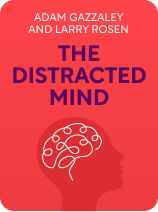

This article is an excerpt from the Shortform book guide to "The Distracted Mind" by Adam Gazzaley and Larry Rosen. Shortform has the world's best summaries and analyses of books you should be reading.
Like this article? Sign up for a free trial here.
Do you get distracted easily? How can you become more resistant to interference?
The Distracted Mind by Adam Gazzaley and Larry D. Rosen has potential remedies for the detrimental effects of interference. Although there are no foolproof cures, Gazzaley and Rosen contend that we can minimize our susceptibility to interference by taking steps to improve our cognitive control and minimize potential sources of interference.
Check out how to not get distracted and stay on track.
Strategy #1: Improve the Brain’s Cognitive Control
Gazzaley and Rosen reason that one way to learn how to not get distracted is to improve our cognitive control. Although they consider various activities to strengthen our cognitive control, we’ll focus on the four that they contend have the strongest empirical support: physical exercise, meditation, cognitive exercise, and certain video games. Of these four, they note that only physical exercise rises to the level of a prescriptive recommendation, while the other three have comparatively less empirical support.
Activity #1: Physical Exercise
To begin, Gazzaley and Rosen argue that a wide body of research clearly supports the beneficial impact of physical exercise on cognitive control. For instance, one study found that, after consistently undergoing aerobic exercise, children experienced significant boosts in cognitive control. But these results aren’t just limited to children; Gazzaley and Rosen observe that, according to multiple meta-analyses of published studies, physical exercise is predictive of increased cognitive control in adult populations as well.
Activity #2: Meditation
Although exercise has the best-established benefits for cognitive control, Gazzaley and Rosen contend that consistent meditation might also be beneficial, especially for our selective attention. In support of their claim, Gazzaley and Rosen cite a seminal study that examined young adults with no previous experience meditating as they went through a five-week long meditation course. This study found that, compared to a control group, participants in the meditation course performed significantly better at tests measuring their selective attention.
Activity #3: Cognitive Exercise
In addition to meditation, Gazzaley and Rosen suggest that cognitive exercise can improve our cognitive control. Cognitive exercise refers to adaptive “brain games” that become more difficult over time to match players’ skill levels. For example, in Gazzaley’s laboratory, participants took part in a game called Beepseeker—they heard three tones and had to determine whether a target tone was present among the tones, thus testing their ability to filter out extraneous information. Gazzaley and Rosen observed that, over time, older adults who participated in Beepseeker became less vulnerable to distractions in the game, demonstrating improved cognitive control.
Activity #4: Video Games
In a similar vein, Gazzaley and Rosen argue that playing certain video games can also lead to improved cognitive control. Specifically, they cite a study showing that video game players showed superior capacity for attention, both in terms of how fast they processed information and how much information they could attend to simultaneously. This finding was strongest among those who play action games because those games require juggling more tasks simultaneously than non-action games. Moreover, the authors point out that after this initial study, other studies have shown a link between playing video games and increased aspects of cognitive control, such as better working memory and goal management.

———End of Preview———
Like what you just read? Read the rest of the world's best book summary and analysis of Adam Gazzaley and Larry Rosen's "The Distracted Mind" at Shortform.
Here's what you'll find in our full The Distracted Mind summary:
- How technology has made us more prone to distractions and interruptions
- How to modify your environment to reduce distractions and boredom
- How to minimize your susceptibility to interference and improve cognitive control






